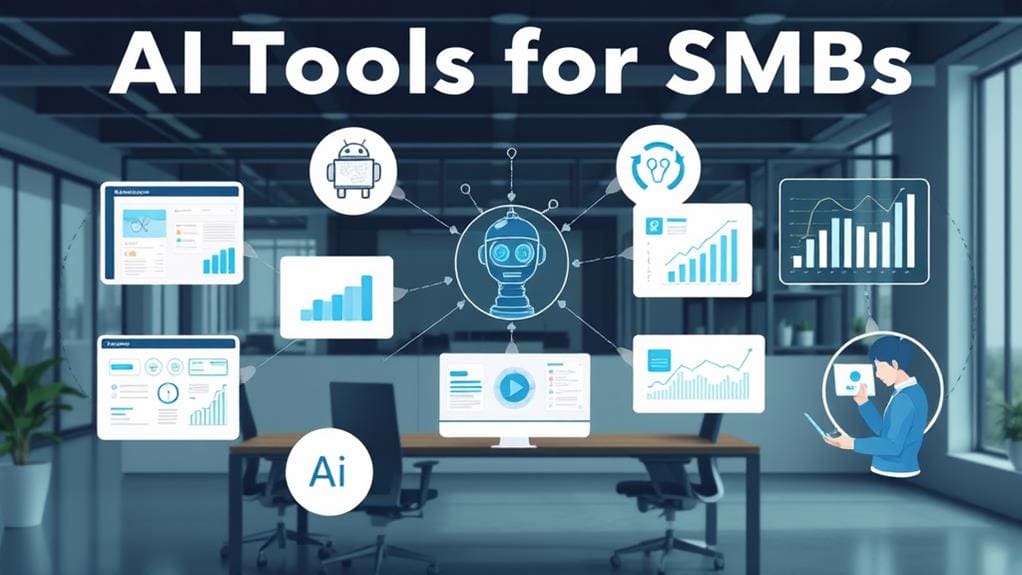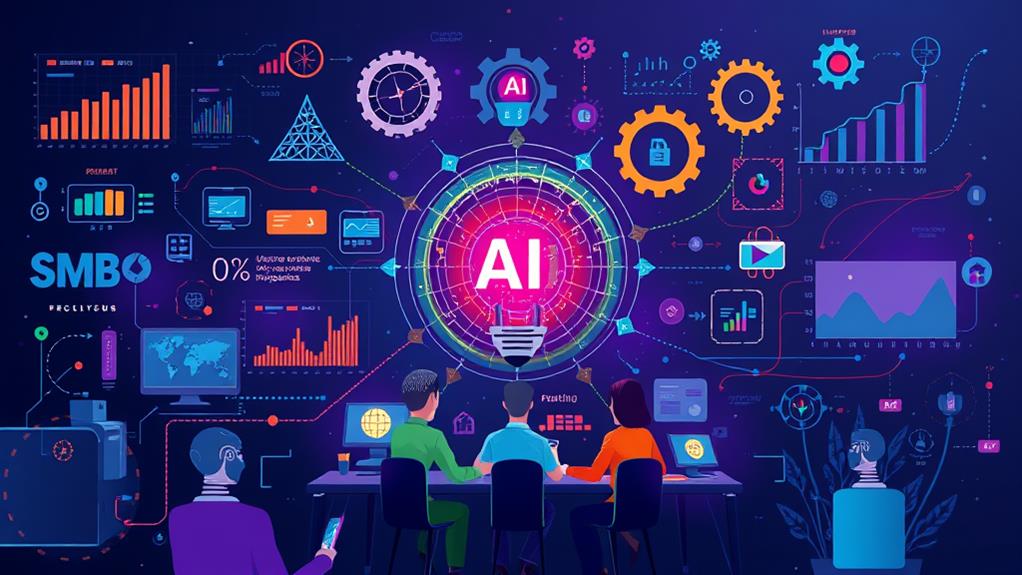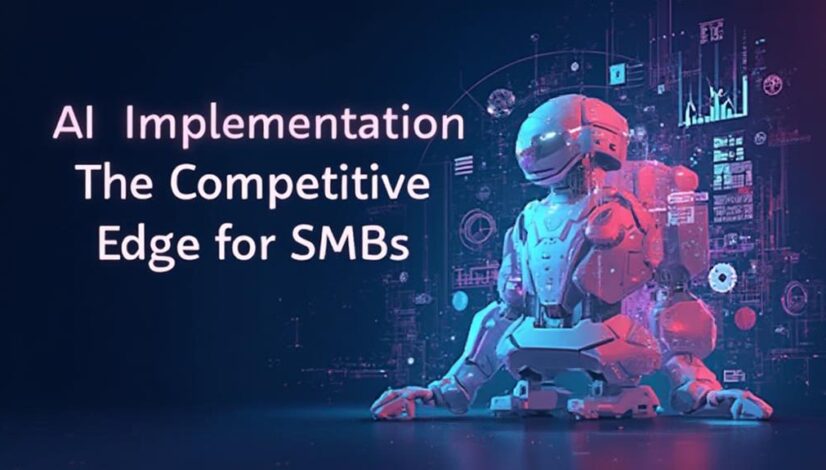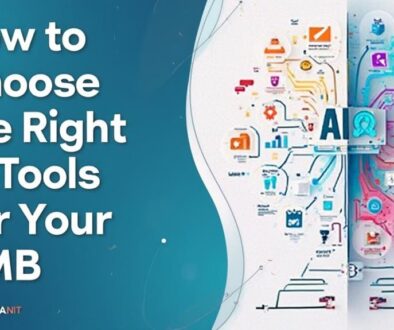AI Implementation: The Competitive Edge for SMBs
AI implementation is a pivotal strategy for small and medium-sized businesses (SMBs) seeking a competitive edge. By leveraging AI technologies, SMBs can optimize workflows, make informed decisions, and enhance customer experiences, ultimately driving growth and efficiency. Common misconceptions about AI limiting its use to larger enterprises overlook its accessibility for all businesses. Though the initial investment can be substantial, the long-term advantages and operational efficiencies greatly outweigh costs. Implementing AI not only differentiates offerings in a crowded market but also positions SMBs for future success. To discover strategies for effective AI adoption and integration, further insights await.
Key Takeaways
- AI enhances operational efficiency for SMBs by optimizing workflows, enabling better resource management, and driving productivity improvements.
- Adopting AI equips SMBs with real-time data analysis, leading to informed decision-making and swift responses to market changes.
- Personalized customer experiences driven by AI foster satisfaction and loyalty, ultimately boosting retention and revenue growth for SMBs.
- Marketing automation and data analytics tools allow SMBs to streamline outreach and develop targeted strategies, improving customer engagement and market reach.
- Successful AI implementation is evidenced by case studies showing increased profitability, optimized operations, and improved customer satisfaction among SMBs.
Understanding AI for SMBs

Leveraging advanced technologies, small and medium-sized businesses (SMBs) are increasingly recognizing the transformative potential of artificial intelligence (AI). Understanding the fundamentals of AI is essential for these organizations as they navigate the complexities of implementation.
Many SMBs suffer from AI misconceptions, believing it is exclusively reserved for larger enterprises or excessively costly. In reality, AI basics—including machine learning and natural language processing—are accessible and adaptable for businesses of any size.
A vital component of successful AI adoption lies in evaluating SMB readiness. Organizations must examine their existing infrastructure, culture, and resource allocation to determine the necessary AI training their teams require.
Addressing ethical considerations is paramount; companies must establish responsible practices to mitigate biases in their algorithms and data usage.
In terms of cost implications, while initial investment may appear intimidating, the long-term benefits often outweigh these expenses. Industry-specific applications can enhance efficiency and decision-making, whether in retail, finance, or healthcare.
However, the effectiveness of AI hinges on robust integration strategies that account for the unique workflows and challenges within these sectors.
User adoption remains a pivotal factor in successful AI initiatives. Leadership must actively engage employees during the shift, fostering a culture of innovation while addressing scalability issues.
Ultimately, by understanding AI and strategically applying its principles, SMBs can reveal significant advantages—navigating their path to a more efficient and competitive future.
Benefits of AI Adoption
The advantages of adopting artificial intelligence (AI) for small and medium-sized businesses (SMBs) are increasingly becoming apparent as organizations seek to optimize operations and enhance competitiveness.
AI presents a transformative opportunity to not only streamline operations but also drive considerable cost savings. By automating routine tasks, businesses can redirect human resources towards more strategic initiatives, leading to workforce augmentation and innovation acceleration.
The potential of AI is illustrated by several key benefits:
- Improved Efficiency: AI systems can analyze vast amounts of data and identify patterns that humans may overlook, leading to optimized workflows and refined processes.
- Enhanced Decision Making: With real-time data analysis and predictive analytics, businesses can make informed decisions quickly, considerably improving their response to market changes.
- Personalized Customer Experiences: AI technologies enable businesses to tailor their offerings, ensuring that customers receive personalized interactions, fostering loyalty and satisfaction.
- Competitive Differentiation: Implementing AI solutions can set a business apart from competitors by enhancing the quality of services or products and increasing market responsiveness.
Incorporating AI into their framework allows SMBs to not only gain operational advantages but to also position themselves for future growth.
The journey towards AI adoption may seem challenging, yet the resulting improvements in efficiency and decision-making, combined with the competitive differentiation gained through personalized experiences, make a compelling case for SMBs to embrace this technological evolution.
Key AI Tools for SMBs

In the evolving landscape of small and medium-sized businesses (SMBs), leveraging key AI tools is essential for enhancing operational efficiency and customer engagement.
Chatbots facilitate real-time interactions, while data analytics solutions provide actionable insights to inform strategic decisions.
Additionally, marketing automation tools streamline outreach efforts, enabling SMBs to optimize their marketing initiatives and improve overall performance.
Chatbots for Engagement
Chatbots represent a transformative force for small and medium-sized businesses (SMBs), enhancing customer engagement through real-time interaction and personalized communication. By harnessing AI-driven solutions, these digital assistants not only improve customer service but also elevate the user experience, leading to greater brand loyalty and operational efficiency.
- Instant Response Time: Chatbots provide immediate answers to customer inquiries, reducing waiting periods.
- Conversational Design: Well-designed chatbot conversations mimic human interaction, making users feel valued and understood.
- Lead Generation: By qualifying leads through engaging dialogues, chatbots facilitate smoother shifts into the sales funnel.
- Personalization Strategies: Chatbots can utilize customer data to tailor interactions, ensuring unique engagement for each user.
Incorporating chatbots empowers SMBs to not only enhance their customer service but also build lasting relationships with clientele.
With their ability to streamline operations and enhance engagement metrics, chatbots represent a strategic investment for SMBs seeking to thrive in a competitive landscape.
As businesses focus on maximizing efficiency while maintaining human touchpoints, the role of chatbots becomes paramount in ensuring sustained growth and customer satisfaction.
Data Analytics Solutions
Harnessing data analytics solutions has become crucial for small and medium-sized businesses (SMBs) looking to leverage their data for strategic decision-making. The adoption of analytics platforms enables SMBs to access real-time insights that drive data-driven decisions, ultimately enhancing operational efficiency and competitive positioning.
Data visualization tools provide an intuitive way to translate complex data into understandable insights, thereby facilitating informed discussions among stakeholders. Furthermore, predictive analytics empowers SMBs to anticipate market trends and customer behaviors, allowing for more effective customer segmentation and targeted initiatives.
To establish a robust data governance framework, businesses must guarantee that data quality and integrity are prioritized, as these elements are essential for accurate performance metrics. By focusing on data integration, SMBs can unify disparate data sources, leading to a thorough view of their operations and market landscape.
Investing in business intelligence capabilities equips SMBs with the tools necessary to analyze their performance in real time, fostering a culture of accountability and continuous improvement.
In this evolving landscape, data analytics solutions are not just valuable; they are crucial for sustained growth and success.
Marketing Automation Tools
Small and medium-sized businesses (SMBs) are increasingly turning to marketing automation tools to streamline their marketing efforts and maximize outreach. By leveraging advanced AI capabilities, these tools facilitate a more strategic approach to engaging customers and driving revenue.
Key features of top marketing automation tools include:
- Email campaigns: Automate and personalize outreach to address specific customer needs.
- Lead scoring: Prioritize leads based on engagement and likelihood to convert, enhancing sales efficiency.
- Customer segmentation: Tailor communications to distinct audience groups for more effective marketing strategies.
- Multi-channel integration: Unify efforts across social media, content creation, and other platforms for cohesive branding.
Incorporating these tools allows SMBs to enhance performance tracking and audience targeting, enabling them to create personalized messaging at scale.
Workflow automation reduces repetitive tasks, freeing up valuable time for creative pursuits. The freedom to focus on strategic initiatives is essential, as it empowers SMBs to build stronger relationships with their customers.
In a competitive landscape, the adoption of marketing automation tools becomes not just beneficial but vital for growth and sustainability. These innovations offer the agility that modern businesses need to thrive.
Steps to Implement AI
Implementing AI can be a transformative journey for small and medium-sized businesses (SMBs), yet it requires a strategic approach to guarantee success. The first critical step is AI strategy development, which involves evaluating specific business needs and identifying areas where AI can enhance efficiency or drive innovation.
By aligning AI initiatives with core business objectives, SMBs can focus their efforts on projects that promise the greatest impact, making sure that resources are allocated wisely.
Once a robust strategy is in place, the next essential step is workforce training. The successful integration of AI technologies into daily operations hinges on the capabilities of the workforce that will be utilizing them.
It is crucial to foster a culture of continuous learning where employees are encouraged to develop new skills relevant to AI tools and data analysis. Investing in training programs tailored to the specific AI applications being adopted will assure that staff not only feel empowered but are also equipped to maximize the benefits of these technologies.
Furthermore, continual improvement must be emphasized throughout the implementation process. Regularly revisiting the AI strategy to adapt to changing market conditions and technological advancements will position SMBs for sustained competitive advantage.
Case Studies of Successful SMBs

Many SMBs have successfully leveraged AI technologies to catalyze growth and streamline operations, demonstrating the vast potential that this transformative tool holds. Success stories abound, showcasing industry examples where innovative strategies have led to remarkable outcomes.
- Retail Transformation: An SMB in the retail sector utilized AI for inventory management, resulting in significant reductions in waste and stock shortages, consequently enhancing operational efficiencies.
- Customer Experience Enhancement: A service-oriented SMB integrated AI-driven chatbots, allowing real-time customer insights which improved response times and satisfaction rates, leading to considerable revenue boosts.
- Data-Driven Decision Making: A manufacturing firm adopted predictive analytics powered by AI, leading to data-informed decisions that streamlined production processes and resulted in substantial growth impacts.
- Marketing Optimization: A small marketing agency utilized AI for data segmentation and targeted advertising, which allowed for personalized campaigns and delivered competitive advantages in a crowded marketplace.
These case studies illustrate how innovative applications of AI are not just theoretical; they have tangible effects on operational efficiencies and market positioning.
By analyzing customer insights, these successful SMBs have outpaced competitors and increased their profitability.
In an increasingly digital landscape, the adoption of AI technologies provides SMBs with the tools they need to thrive. Embracing these advancements can lead to transformative results and sustained growth, thereby empowering businesses to navigate the complexities of modern markets with confidence.
Challenges in AI Integration
Integrating AI into the operations of small and medium-sized businesses (SMBs) presents a myriad of challenges that can impede progress if not effectively addressed. One of the foremost obstacles is the lack of technical expertise within many SMBs. Without individuals possessing the necessary skills to implement and manage AI systems, businesses often face significant difficulties that hinder successful integration.
Budget constraints further complicate AI adoption. Many SMBs operate within limited financial frameworks and may struggle to allocate sufficient resources for both the acquisition of AI technologies and the personnel needed for effective implementation. This financial strain can lead to compromised quality or incomplete integration.
Change management becomes essential during this shift, as employees may exhibit resistance to adoption. The cultural shift required for an AI-centric approach necessitates thorough employee training and robust communication strategies to foster acceptance and understanding of new systems.
Data privacy also poses substantial challenges, as businesses must navigate a complex landscape of regulations while safeguarding sensitive information. This is particularly concerning when integrating AI systems that require substantial amounts of data to function effectively.
Future Trends in AI for SMBs

How will the evolving landscape of artificial intelligence reshape the operations of small and medium-sized businesses (SMBs) in the coming years? As organizations adopt AI-driven technologies, the focus will shift towards creating personalized experiences, harnessing predictive analytics, and optimizing operational efficiencies. The future holds several promising trends that will redefine the capabilities of SMBs.
- Enhanced customer insights: AI will enable businesses to understand their clients better than ever, tailoring products and services to individual preferences.
- Workflow automation: Automated processes will streamline operations, allowing SMBs to allocate resources to strategic initiatives.
- Scalable solutions: As AI technologies become increasingly accessible, businesses can implement scalable solutions that grow alongside their needs.
- AI ethics and responsible use: The responsible integration of AI will be paramount, focusing on ethical considerations while utilizing powerful machine learning tools.
The potential for cost reduction is significant; SMBs can leverage user-friendly interfaces that require minimal training to facilitate talent acquisition and employee engagement.
During a time when customer expectations are rapidly evolving, AI delivers a competitive advantage by enabling real-time decision-making through enhanced predictive analytics.
Ultimately, embracing these future trends will empower SMBs to thrive in an increasingly competitive landscape.
Frequently Asked Questions
What Is the Cost of Implementing AI for Smbs?
The cost of implementing AI for small and medium-sized businesses (SMBs) involves several budget considerations, including initial setup, ongoing maintenance, and necessary training.
Engaging in a thorough ROI analysis is essential to assess potential returns against these expenditures.
While upfront costs may appear intimidating, the long-term efficiencies, improved decision-making, and enhanced customer experiences that AI offers can lead to substantial financial gains, ultimately justifying the investment for forward-thinking SMBs.
How Can SMBS Measure Ai's Effectiveness?
To effectively measure AI's impact, SMBs should utilize AI success metrics tailored to specific business objectives.
Remarkably, companies that embrace AI see a 30% increase in operational efficiency.
By conducting a thorough ROI analysis, businesses can quantify improvements in productivity, cost reductions, and revenue growth attributable to AI initiatives.
This analytical approach empowers SMBs to make informed decisions, ensuring that their investments yield tangible benefits and foster a culture of innovation and autonomy.
Are There Industry-Specific AI Solutions for Smbs?
Yes, there are numerous industry-specific AI solutions tailored for small and medium-sized businesses (SMBs).
These solutions effectively address sector challenges by leveraging advanced algorithms to enhance operational efficiency and drive innovation aligned with industry trends.
By utilizing AI, SMBs can better navigate market demands, streamline processes, and facilitate informed decision-making.
The adoption of such targeted AI technologies empowers businesses, granting them the autonomy to thrive in competitive landscapes while harnessing data-driven insights.
What Skills Are Needed to Manage AI Projects?
Managing AI projects requires a nuanced skill set that blends technical expertise with strong project management capabilities.
Successful AI project management hinges on robust team collaboration, fostering an environment where diverse talents can converge.
Key skills include proficiency in data analysis, familiarity with machine learning concepts, and adeptness in agile methodologies.
Additionally, effective leadership and communication skills are critical to align team objectives, steering through complexities inherent in AI development to achieve desired outcomes efficiently.
Can AI Be Integrated With Existing Software Systems?
Integrating AI with existing software systems is feasible, yet it presents AI compatibility challenges that organizations must address.
Effective software integration strategies, such as leveraging APIs and modular architecture, can facilitate this process. By ensuring seamless communication between AI tools and legacy systems, businesses can enhance functionality while maximizing their existing investments.
A carefully executed integration not only preserves operational continuity but also empowers organizations to harness the transformative potential of AI without sacrificing system integrity.
Conclusion
To summarize, the integration of artificial intelligence within small and medium-sized businesses (SMBs) is not merely a trend but a strategic imperative. A study by McKinsey & Company indicates that 70% of organizations will have adopted at least one AI technology by 2025, illustrating the urgency for SMBs to embrace these innovations. As the landscape continues to evolve, those that leverage AI effectively will secure a significant competitive advantage, driving efficiency and growth in an increasingly digital marketplace.




